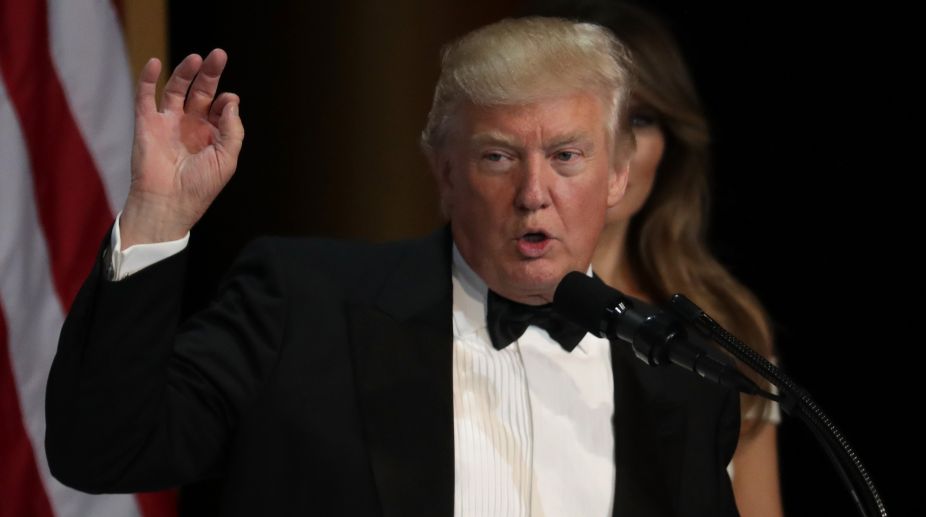Karla Sofia Gascon, 1st transgender Oscar nominee, takes on Donald Trump for anti-trans stance
Karla Sofia Gascon makes history as the first openly transgender Oscar nominee for Best Actress, earning acclaim for her role in 'Emilia Perez'.

(Photo: AFP)
Over the Chinese New Year holidays, we were all treated to the Trump Reality Show, changing the world we thought we understood with various tweets or executive orders.
This behaviour reminded me of the Chinese philosopher Zhuangzi waking up and not being sure if he was a man dreaming that he was a butterfly, or a butterfly dreaming that it was a man. Mr Trump is either a butterfly disguised as President or a truly smart politician disguised as a butterfly. The tragedy is that the rest of us have to live with the consequences.
Advertisement
This week, after humiliating Mexico and reversing his position on NATO, Trump and his advisers have switched to stoking a currency fire, accusing China and Japan of manipulating their currency and even suggesting that Berlin is exploiting a “gross undervalued” euro.
Advertisement
Whatever you think of Trump, he was smart enough to appoint someone like Steve Bannon as his Chief Strategist. You always can judge a leader by the people he or she surrounds himself with. Bannon is pure American success story – Harvard trained, ex-Goldman Sachs, ex-Navy, and founding entrepreneur of Breitbart news, a platform that claims to represent the alt-right and third most influential news channel after Bloomberg and Reuters.
In a remarkable 2014 speech (https://www.buzzfeed.com/lesterfeder/this-is-how-steve-bannon-sees-the-entire-world), Bannon claimed that (this)…”is a crisis both of our church, a crisis of our faith, a crisis of the West, a crisis of capitalism.”
Taken on its own, there is nothing wrong with someone having a view of the world in crisis. But Bannon is now in a pivotal position to do something about it.
The dollar has maintained its position as a global standard because it is convenient, cheap to use and a store of value that has so far been subject to minimal political interference.
The rest of the world is now stuck with a “damned if we do, and damned if we don't” dilemma. If we continue to rely on the dollar, how do we avoid being accused of being manipulators, when in reality so far the market forces are stronger than any central bank on its own? If we don’t rely on the dollar, we will anyway be accused of being manipulators, particularly if the currency depreciates against the dollar.
In other words, what is at stake is not a crisis of the West or its faith (which the Rest cannot change), but a crisis of faith within the Rest on the leadership in the West. The dollar remains the anchor of global stability, but when the solo anchor itself is adrift, we need to find alternative anchors. Single anchors are efficient but dangerous if they wobble. We need two or three anchors to triangulate global stability.
Here is another inconvenient truth – it’s Trump’s dollar, but the Rest’s savings. Based on the US Bureau of Economic Analysis, the US has net global liabilities of $7.8 trillion or 41.7 per cent of GDP at the end of the third quarter 2016. This has deteriorated from $2.5 trillion or 16.8 per cent of GDP at the end of 2010.
The cumulative current account deficit (from trade) between end 2010 and 2016 Q3 was only $2.0 trillion, which meant that the rest ($3.3 trillion) was due to valuation changes (change in US dollar exchange rate) or financial account flows.
In other words, it is capital flows rather than trade that are the major driver of the exchange rate, with interest rate differentials influencing also the exchange rate.
If that is the case, going forward the US net debt position will depend largely on the future global savers, mostly Europe and Asia. And if the savers are subject to constant lecturing by the Trump administration, an alt-dollar solution will have to be found.
During the Asian financial crisis, Europe sided with the US to reject an Asian Monetary Fund in a move against regionalisation. But if today, the America First strategy is designed at isolating the Rest, then the Rest must unite to protect global trade and investments. If the non-dollar zone can maintain currency stability against the dollar, then there will be fewer accusations of currency manipulation, forcing the debate into how the US can restore its own fiscal and trade balance to maintain its own savings equilibrium.
In short, the Rest needs to remind the US that she is important, but cannot blame the Rest for all her own problems.
The reserve currency central banks have a major role to ensure currency stability, which can be only preserved by ensuring liquidity and discipline. So far, the Fed has shown responsible leadership, with strong support from the ECB, Bank of England, Bank of Japan and the People’s Bank. But if the dollar is being politicised, then alternatives can and should be found.
All options are now on the table. If the US is no longer dependent on oil and energy, then oil and energy suppliers can price oil trade in currencies other than the dollar. We have seen this before in the competition between different technology standards. The leading standard becomes dominant because it is willing to provide public goods (lots of freebies). But when the dominant standard becomes predatory or extractive in using its monopoly position, then it is time to use alternative standards.
No one should take their position or customers from granted. The Rest will not stand still whilst Trump and his cohorts decide to change allies and foes by the tweet. None of us are against the dollar but we are for global stability, common sense and mutual respect. The Euro, Sterling, Yen, RMB and SDR’s time has come.
The writer, a former Central banker, comments on global issues from an Asian perspective.
Special to ANN.
Advertisement